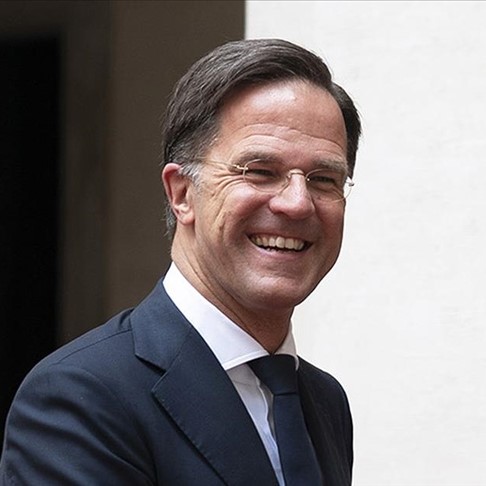He made history by being the prime minister for 11 years without interruption: Mark Rutte
Dutch Prime Minister Mark Rutte was born in The Hague in 1967. Working in the human resources department of private companies, Rutte started his political career in the 90s. Rutte, who has been the chairman of the People's Party for Freedom and Democracy (VVD) for many years, which was founded in 1948, has been serving as the Prime Minister since October 2010.

He was appointed as the Minister of State for Labor and Social Affairs in 2002 and as the Secretary General of the Ministry of Vocational Education and Higher Education in 2004. In the general elections in 2010, Rutte offered suggestions that would come to the rescue of an economy that was in trouble with austerity policies. He implied that he could form an alliance with the Freedom Party led by far-right Geet Wilders at that time, “We do not exclude any party, any one… But there are big differences between my party and the Labor Party and the Freedom Party.” had spoken.
He won the general election in 2010
The winner of the general elections in 2010 was Mark Rutte's party. It was the first time since 1948 that the liberal party had won the elections. Queen Beatrix asked Rutte to form the government. Rutte was supposed to go to the coalition. In 2010, a minority government was formed in the Netherlands, for the first time since the Second World War, with the outside support of the far-right Freedom Party (PVV) with the Liberal Party (VVD)-Christian Democratic Party (CDA) coalition.
Crackling in coalition government: Early elections
However, the far-right PVV withdrew its support from the government when they could not agree on the EU and budget issues. Rutte had to submit his resignation to the Queen. After 1.5 years in power, early elections were held.
2012: Rutte again Prime Minister
A coalition government was formed between the two parties with the most votes, the Liberal Party (VVD) (26.6%) and the Labor Party (PvdA) (24.9%), under the Prime Minister of Mark Rutte. (November 5, 2012) The coalition government in office since 2012 has managed to improve the economic balance sheet, but it was the middle class people who paid the price.
Pro-European Mark Rutte underlined once again that he would not form a coalition government with Geert Wilders, reminding him of the promises that Wilders did not fulfill, by anti-Islam.
August 3, 2022
Mark Rutte, who has been the Prime Minister of the Netherlands since he took office on October 14, 2010, has become "the longest-serving Prime Minister of the country as of today". Rutte, who continues his 4th Prime Ministry term, completed his 4,311th day in total with 11 years, 9 months and 19 days.
Rutte, 55, who broke the 4,310-day record of Ruud Lubbers, who served as the Prime Minister in the country during the 1982-94 period, said that this situation did not mean "a different meaning" to him.
The youngest of the family of 7 children
Born on February 14, 1967 in the capital, The Hague, Rutte draws attention as the youngest member of the family with 7 children.
Dreaming of becoming a pianist in his youth, Rutte headed the youth branch of the People's Party for Freedom and Democracy (VVD), which he headed, during and after university years.
Rutte joined Unilever in 1992 after graduating from Leiden University in History. Rutte, who worked here until 2002, took on different duties in the field of human resources for 10 years at the company.
Rutte, who is not married and has no children, stated that he was satisfied with his private life and marital status.
Events that forced Rutte
Rutte has struggled with many important crises such as finance, euro, refugee, Brexit crises and Kovid-19 during his rule.
One of the developments that challenged Rutte was the earthquakes and damage to some buildings due to natural gas extraction activities in Groningen in the north of the country.
On the other hand, the refugee crisis in 2015 forced Rutte, like other EU leaders. Rutte, who did not completely close the refugee door, which turned into a real crisis for many EU countries, enabled a limited number of Syrian refugees to come to the Netherlands.
The most challenging event for Rutte was the childcare aid scandal. In 2020, a parliamentary research group found discrimination based on ethnic origin against those with dual citizenship. Accordingly, in the 2017-2018 period, it was understood that the Tax Office officials used algorithms that focused on those with dual citizenship in the examinations of families receiving childcare assistance. Due to the miscalculations made by the Tax Office, the child care allowances were cut due to reasons such as "falsification of documents" and a large amount of payment was requested retrospectively, and their children were taken from them on the allegation that they neglected their care after the financial destruction they experienced.
The Rutte government has struggled with the actions of farmers protesting their decision to reduce nitrogen emissions, such as road closures, burning hay and dung, and blocking food distribution points since June.
"Teflon Mark"
Described as the "Teflon Mark" for surviving the political crisis and turmoil, Rutte managed to maintain his position as Prime Minister after the childcare aid scandal and the earthquakes caused by the natural gas exploration activities in Groningen.
"He sells himself well"
Politicians serving in his cabinet describe Rutte as "calm", "non-irritable", "well-trained" and "self-marketing".
Rutte, who used the phrase "I still have new ideas and energy" before the 2021 elections, has no serious rivals in his party.
Rutte maintains his position as "the longest-serving Prime Minister in the European Union (EU) after the Hungarian Prime Minister Viktor Orban".
